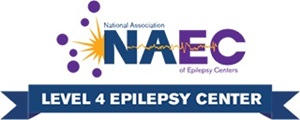Epilepsy is one of the most common brain disorders, affecting about 3 million people in the United States. It can cause seizures, which is an event in the brain characterized by a disruption in your brain’s electrical signals.
Seizures occur when there is a sudden burst of electrical activity that disrupts normal brain functions. Seizure symptoms depend on whether they involve only a part of the brain or both sides of the brain, but they can happen very suddenly and without warning. Typically, seizures are followed by unresponsiveness lasting seconds to minutes, or by convulsive symptoms.
San Antonio's Only Level IV Epilepsy Center
The South Texas Comprehensive Epilepsy Center (STCEC) is Central and South Texas’ only comprehensive epilepsy treatment center for both adult and pediatric patients with epilepsy. The STCEC treats over 6,000 patients each year and is San Antonio’s only Level IV epilepsy center, the highest accreditation from the National Association of Epilepsy Centers.
Through our partnership with UT Health San Antonio, this designation means we offer the most advanced diagnostic and treatment options available, including innovative options for people whose seizures aren’t controlled by medications.
Learn more about our epilepsy team.
Types of Epilepsy We Treat
Epilepsy is categorized by whether they are focal in onset, with seizures starting in one part of the brain, or generalized in onset, seizures beginning simultaneously on both sides of the brain.
Focal and generalized epilepsies include many different types of epilepsy and seizures. Epilepsy known causes include:
- Brain injuries due to stroke, infection or trauma
- Genetics
- Developmental Causes
For many people, the cause of the epilepsy is unknown until they undergo a rigorous diagnostic evaluation. From there, our specialists will be able to provide a personalized treatment plan.
Diagnostic Evaluations and Treatment
As one of the largest epilepsy programs in Texas, the specialists at the STCEC are able to provide you with the highest level of expertise and sophisticated diagnostic technology available in the area.
Located within University Hospital, our state-of-the-art Epilepsy Monitory Unit (EMU) us the largest inpatient monitoring unity in San Antonio, housing 16 beds—10 dedicated to adults and six to children with epilepsy.
Advanced Surgical Procedures
Advanced surgical procedures for adults and children range from vagal nerve stimulator (VNS) implantation to brain surgery.
Epilepsy Clinical Trials
We also conduct clinical trials for new seizure medications and devices, in partnership with UT Health San Antonio.
Epilepsy Support
The STCEC has a long-standing relationship with the Epilepsy Foundation of Central and South Texas (EFCST). While the STCEC relies on the resources and support of the EFCST to help people with epilepsy cope with their disease, the adult epilepsy care team are able to help people with epilepsy at outreach clinics staffed by the EFCST in San Antonio, Eagle Pass, Laredo, Corpus Christi, Harlingen and Del Rio.

